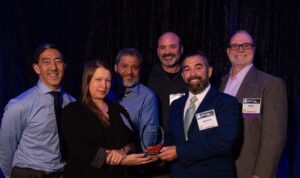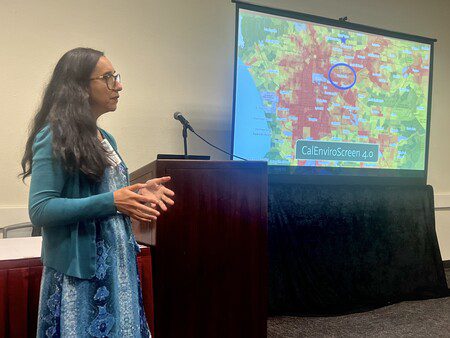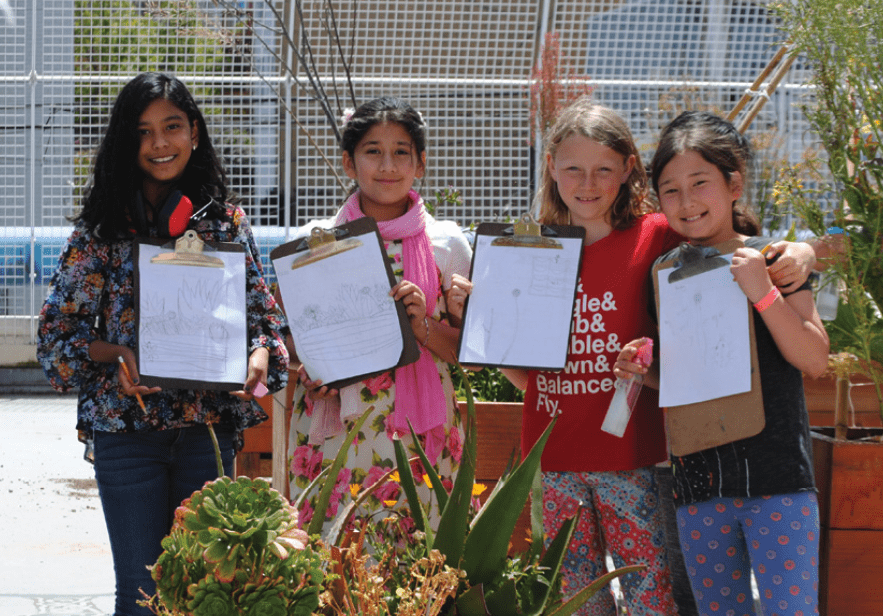Awards, Meet-Ups & Solidarity for CAELI’s District Innovation Hub

There is good news! A growing number of school districts from every corner and context in California are developing environmental literacy and sustainability plans to ensure that every student has access to high-quality environment-based learning and climate-ready school campuses.
Even better news, leaders in many districts are moving toward a whole systems approach by including a wider range of partners and perspectives in the transformation process. Despite momentum across California’s school districts, this can be lonely work. California is a very large state and districts themselves can be extremely siloed. To address this challenge and to expand its network of district leaders ready to share their expertise, CAELI’s District Innovation Hub hosted its third annual meetup at the Green California Schools and Higher Education Summit in Pasadena last month. For their ongoing efforts, the hub received this year’s statewide Environmental Literacy Leadership award.
“A key aim of the District Innovation Hub is to build a community of environmental literacy and sustainability champions. We know there are so many more champions out there doing great work in isolation, and we want you to know that you are not alone and we see you working hard in small and massive ways for the health of your communities,” emphasized Nathan Inouye, Assistant Director of Instructional Services at Moorpark Unified School District and long-time CAELI member.
Last year’s meetup inspired the district innovation hub to keep networking and storytelling a central part of their work and they launched the District Innovation Webinar Series, which features leading-edge exemplars in each of the Green Ribbon Award pillars of sustainability, health, and instructional programs.
Since then, the District Innovation Hub has grown to include folks in many newly-created district-level positions:
- Jermaine Reece as Stockton Unified’s Energy Education Specialist
- Gloria Hardwood as Laguna Beach Unified’s Coordinator of Environmental Literacy
- Ellen McClure, the Climate Literacy Teacher on Special Assignment at Berkeley Unified School District.
The stories shared by a wide range of experts who were recruited by the hub to host workshops during the Summit’s Education Program were a highlight for many. Many conference attendees appreciated the connection and real-life stories from other attendees. The hub worked to facilitate connection by hosting discussions and activities during meals and networking times throughout the conference. Ellen McClure said she “appreciated being able to learn from and talk with so many people from other districts who share the common goal of advancing environmental literacy. I left with a better understanding of efforts across the state.”
New hub member and first-time conference attendee Oscar Hernandez, Assistant Superintendent of Instructional Services Rio School District, noted that “every district is at a different stage in their environmental literacy initiatives, and there is a lot of support from everyone. CAELI provides access to a wide range of resources that can be used by educators across the state and beyond.” His district presented on their recent California Silver Green Ribbon District Award for their multi-faceted approach including farms, gardens, healthy eating, ocean pollution, and wellness centers. Because it provides a shared language for recognition, the Green Ribbon award provides a popular entry point to this work for districts. CAELI’s Taking Green Ribbon to Scale Campaign connects folks able to provide technical assistance to those looking to apply for the award.
You Are Not Alone: Hearing from District Leaders
As the hub is learning, there are many entry points to district environmental literacy. The conference was especially helpful to see and hear about the incredible work that is being done across every region of the state.
A growing number of districts are passing board resolutions requiring climate change education. This is the case in Fremont Unified, where District Innovation Hub Co-Lead Nate Ivy works. Ivy, along with hub member Monica Maynard from Montebello Unified School District and Jennifer McRae from San Lorenzo Valley Unified, presented to a packed room on “Creating a District-Wide Environmental/Climate Literacy Plan.” They each told their stories of how their suburban, rural, and urban districts, respectively, are incorporating environmental learning into district-wide instructional planning and professional learning.
Maynard described the evolution of her work with the State Education and Environment Roundtable and a key group of teacher leaders to develop a K–12 scope and sequence of environmentally themed lessons to address California’s Next Generation Science Standards (CA NGSS) through California’s Environmental Principles and Concepts beginning in 2018. For one high school chemistry unit, as this 2019 Case Study recounts, “On a simple walk to Montebello Park during a Saturday professional development session, a team of high school teachers became curious about an ever-burning torch at the Veterans’ Memorial and in turn developed an inquiry process for their students.” Maynard explained that this unit has now grown into a robust civic engagement project in which students are interviewing World War II veterans and thoughtfully re-designing a more climate-friendly memorial in their own community. Maynard, too, is still learning. She said of the meetup, “I learned how other districts implement environmental literacy and how important it is to have the facilities group in the loop.”

This integration is exactly what Gil Blue Feather Rosas, Director of Sustainability & Adaptation at Modesto City Schools, and Jeff Rivero from Merced Union High School District showcased in their presentation “Coordinating District Greening: Linking Sustainability, Equity, and Environment Literacy”. Their “Green That School” project exemplifies the synergy of districts connecting the dots of sustainability, environmental literacy, equity, diversity, and inclusion to combat climate change. By pooling resources and expertise, both communities have embarked on a transformative journey to create environmentally conscious learning environments, while fostering inclusivity and equitable access to education. Rosas said, “I appreciated the opportunity for Merced Union students to get a chance to present and show people what they know and what they do.” Merced Union was honored with the District Leadership award at the ceremony.

Hearing so many stories like these, hub member and Cabrillo Unified Superintendent, Sean McPhetridge, expressed gratitude for the positive changes being made at the district level. In his session titled “Go for the Green! Leading Sustainability Initiatives for School and District Improvement,” he encouraged the continued growth of CAELI’s membership, emphasizing the need to expand the impact of these initiatives on a larger scale.
Creating Equity and Effective Programs Using Data
CAELI Project Director Andra Yeghoian couldn’t agree more. She addressed scale directly in her presentation, along with Ten Strands’ Amy Frame, Climate Corps Fellow Riki Bertoldi, and UndauntedK12’s Jonathan Klein. In their “Introduction to the Data Initiative for Environmental and Climate Action in California’s TK-12 Schools,” the team introduced its approach and some of its preliminary findings. Audiences were surprised to learn that fifty percent of the state’s nearly 6 million students are clustered into just eighty of the state’s 1,021 school districts, while another twenty percent of students are scattered across 720 different districts. Attendees also learned about newly developed equity indicators that overlay datasets on student socioeconomic status with pollution burdens in school districts. With this information, the District Innovation Hub is developing a set of differentiated strategies to support different types of school districts, and to focus on those with the highest impact and highest needs, rather than taking a one size fits all approach.
To help develop this set of effective approaches, the hub gathered the collective wisdom of attendees in a “world cafe” style discussion. The group acknowledged that school districts encounter significant challenges in promoting environmental literacy. Coordinating efforts across departments, devising cohesive multi-year plans, and garnering widespread support pose major hurdles. Staff turnover and inconsistent leadership exacerbate the issue, leading to a fragmented approach to environmental education. The urgency driven by climate change underlines the necessity for swift, well-funded, and sustained initiatives and dedicated staff. This only emphasizes the need for streamlined efforts in advancing environmental literacy district-wide.
As districts across California continue their journey toward environmental literacy, CAELI’s District Innovation Hub stands as a testament to the power of collaboration, knowledge-sharing, and sustainable practices, benefiting students, staff, families, communities, and ecosystems across the state.
Stay tuned for upcoming resources and events including our spring webinar series and share our first-ever statewide environmental literacy survey to all of the educators, principals, and administrators in your life. This 15-minute survey will help us understand the ways Environmental Literacy Education takes place in California schools. Take or share the survey.
